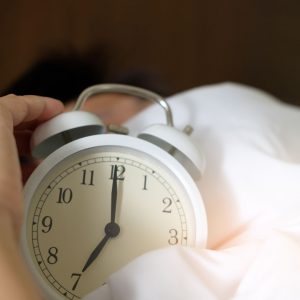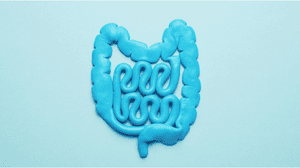
World Sleep Day
This World Sleep Day we're focusing on raising awareness about how regular, quality sleep can contribute to our future health. Have you ever wondered about the connection between sleep and body weight? Read on as we uncoverwhy our sleeping patterns may be impacting weight loss.
To start us off, we asked NHS Doctor, Dr Frankie Jackson-Spence to explain why sleep is so important to our wellbeing:
“Getting enough sleep is vital to your health. It not only improves brain power such as improving concentration and performance at work, but also our ability to interact with others and appropriately recognising social cues! Ever had a bad night’s sleep and felt snappy with your work colleagues or felt everyone is against you? That’s the power of sleep deprivation!”
Why is regular sleep important?
Having a bad night’s sleep now and then won’t do much harm to our health. But having one too many restless nights can impact our health in serious ways, including:Increased risk of developing medical conditions, like type 2 diabetes and heart disease
Lead to mental health conditions, like anxiety and depression
Lead to weight gain
[1]
How can sleep affect our weight?
When we think about looking after our diet, sleep isn’t usually the first thing to spring to mind. Well, what if we told you that recent research estimates we eat, on average, an extra 400 calories per day when we’re sleep deprived [2]. That’s equal to one additional hearty meal per day!
Biologically, this makes a lot of sense. Think about it, we use food as fuel because Calories = Energy. So, when we’re tired, in order to compensate for the lack of energy, we reach for calorie dense foods to give us that all important boost [3].
Sadly, a bad night's sleep can make managing our weight a whole lot harder! That's because a lack of sleep lowers our body's levels of leptin (the hormone that makes you feel full) and increase levels of ghrelin (the hormone that makes us feel hungry), together this leads to overeating and, in turn, weight gain [1].
How can we have a better night’s sleep?
Our bodies have an internal clock, it's the thing that tells us when to perk up in the morning and when to unwind in the evening. We should treat our body’s internal clock as an emotional best friend. It needs a lot of care and attention and is impacted by both internal and environmental factors. The less we prioritise sleep and the more inconsistent our sleep schedule, the more likely we are to upset our body’s internal body clock, leading to confused brain and a twisty-turny night.
Much like our dietary routine (breakfast, lunch and dinner), having the same sleep pattern everyday - even on weekends - helps our body find its natural rhythm, allowing us a more restful slumber.

What are Dr Frankie’s World Sleep Day tips for getting a decent night’s sleep?
“Aim to get 8 hours of good quality sleep a night. To ensure you are actually asleep for 8 hours, aim to get into bed 30 mins before to have some downtime, switch of your phone/laptop/tv for an hour before bed and keep your bedroom cool for a better night’s sleep. Try not to watch tv in your room. If you feel like you’re not tired, get up and go to another room until you feel tired and then come back in. Keep your bedroom just for sleep.”
Finally, we're offering you some top tips just in time for World Sleep Say to help you improve your sleep and restore your body’s sleep-wake cycle:
Lights off, wind down
Melatonin is a light sensitive hormone. In dark atmospheres and during the night, more melatonin is produced, making us feel tired and ready for sleep. Bright lights in the evening inhibit the production of melatonin, which makes us feel more awake and is more likely to delay our ability to drift off to sleep.
Have a set bedtime
Whether it’s a week night or weekend, keep your bedtime consistent. Find a sleep time that suits you and stick to it. You might not feel tired at first, but once your internal body clock falls back into its natural rhythm, catching the Zzzzs will be a breeze.
Have a set wake-up time
In the event of a terrible night’s sleep the night before, it may be tempting to have a lie in the following morning. Doing this puts us at greater risk of throwing off our sleep routine. Resist the urge to sleep in and set your alarm to the same time every morning. Even on the weekend! That way, you’re more likely to feel tired and ready for bed when we’re supposed to.
Have a light evening meal
Instead of filling up on a heavy, spicy, sweet or salty meal, try to opt for something light and easy on digestion. It's best not to eat too close to bedtime, but a light snack is acceptable.
Cut down on caffeine
When it comes to caffeine, different people have different tolerance levels. If you’re not having the most restful night’s sleep, it’s worth considering cutting back on caffeine and trying to have your last caffeinated drink at least 6 hours before you sleep. As a tasty alternative, why not try our caffeine-free BURST?
Cut down on alcohol
Got a habit of reaching for a night cap? Many of us assume a glass of wine or two helps send us off to sleep. Unfortunately, this is not the case. Evidence shows that alcohol leads to poor sleep quality and sleep duration [5]. Need something to fill the night cap space? We’ve got just the tipple! Try our sweet and sophisticated BURST! Now available in easy ready-to-drink cans, BURST is enriched with a multivitamin blend, full of flavour and super low in calories, what's not to love?
Find out even more about BURST below:

exante BURST...The Multivitamin Drink You Need Right Now!
BURST is the new multivitamin energy drink range introduced by exante. This new range comes in three refreshing flavours. Discover more here...
Have you noticed your sleep improving since embarking on your exante journey? We’d love to hear from you! Get in touch with us on Instagram with details of how you'll be taking on these World Sleep Day tips and share your experiences with our lovely exante Facebook community!
- Sleep Better | For Your Body | One You (www.nhs.uk)
- The effects of partial sleep deprivation on energy balance: a systematic review and meta-analysis | European Journal of Clinical Nutrition (nature.com)
- Healthy ways to manage emotional eating – BBC Food
- Physical Health and Sleep: How are They Connected? | Sleep Foundation
- The Effects of Alcohol on Quality of Sleep (nih.gov)










